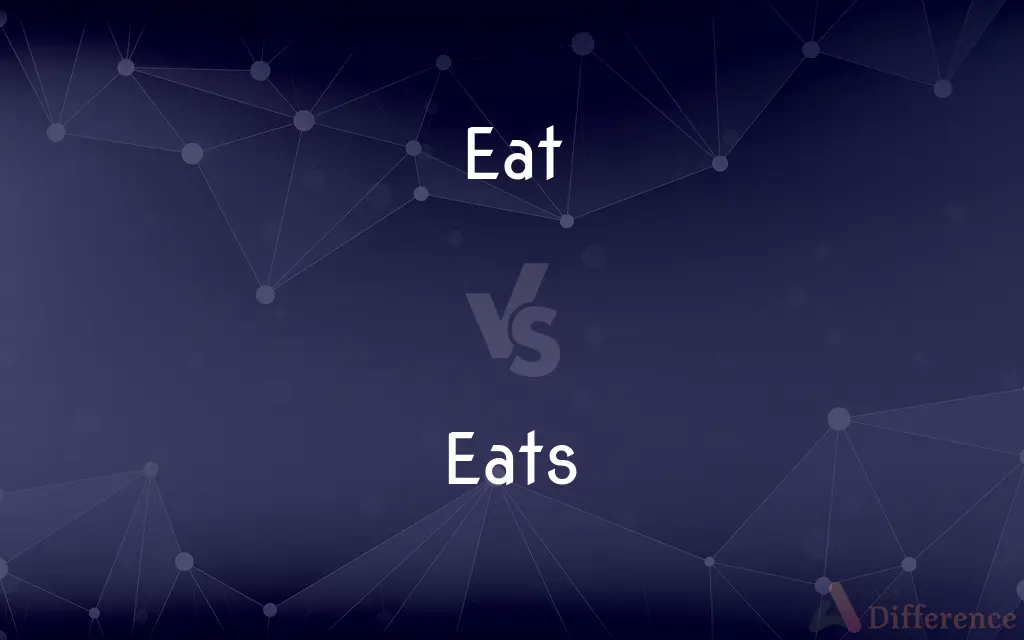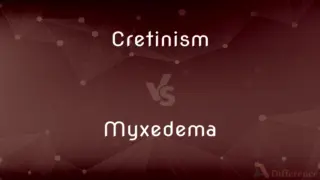Eat vs. Eats — What's the Difference?
Edited by Tayyaba Rehman — By Maham Liaqat — Updated on March 25, 2024
Eat is the base form of the verb, denoting the act of consuming food; eats is the third person singular present tense, used for he, she, or it.

Difference Between Eat and Eats
Table of Contents
ADVERTISEMENT
Key Differences
Eat is a verb that describes the action of consuming food or drink. It is the base form of the verb and is used with subjects like I, you, we, and they. On the other hand, eats is the third person singular present tense form of the verb "eat," applicable when the subject is he, she, it, or a singular noun.
For instance, in the sentence "I eat breakfast at 7 AM," "eat" signifies the act of consuming the morning meal. For example, "She eats breakfast at 7 AM" uses "eats" to indicate the same action of consuming food but specifies that the subject doing the action is singular and present.
While "eat" can also serve as an imperative, a command or request, such as in "Eat your vegetables," "eats" cannot be used in this way. The form "eats" strictly implies that the action is being carried out by another, not as a direct command. Eats also subtly implies a habitual or regular action when used in sentences. Saying "He eats breakfast at 7 AM" suggests a routine or daily habit, emphasizing the regularity of the action for that specific subject.
The difference in use between "eat" and "eats" is crucial for maintaining subject-verb agreement in English. Incorrect use can lead to grammatical errors that may confuse the intended meaning or make the sentence awkward.
Comparison Chart
Form
Base verb
Third person singular present
ADVERTISEMENT
Usage with Subjects
I, you, we, they
He, she, it, singular nouns
Imperative Use
Yes (e.g., "Eat this.")
No
Suggests Habit
No specific implication
Yes, implies a routine or habit
Example Sentence
We eat dinner at 8 PM.
She eats dinner at 8 PM.
Compare with Definitions
Eat
To consume food through the mouth.
We eat lunch at noon.
Eats
Consumes food.
He eats slowly to savor every bite.
Eat
To corrode or erode.
Acid rain eats away at limestone.
Eats
Utilizes resources or time.
The project eats up most of our budget.
Eat
To consume (resources or time) significantly.
Repairing the old car will eat a lot of money.
Eats
Causes gradual damage.
Rust eats into metal over time.
Eat
To destroy, consume, or waste.
Moths ate holes in the clothes.
Eats
Refers to habitual dietary consumption.
She eats vegetarian meals.
Eat
To take into the body by the mouth for digestion.
Tigers eat meat.
Eats
Impacts through consumption or erosion.
The sea slowly eats away at the cliffs.
Eat
Put (food) into the mouth and chew and swallow it
Eat up all your peas
He was eating a hot dog
She watched her son as he ate
Eats
(colloquial) Food.
When are we going to get some eats?
Eat
Light food or snacks
These make great party eats
Eats
Informal terms for a meal
Eat
To take into the body by the mouth for digestion or absorption.
Eat
To take in and absorb as food
A plant that eats insects.
A cell that eats bacteria.
Eat
To include habitually or by preference in one's diet
A bird that eats insects, fruit, and seeds.
Stopped eating red meat on advice from her doctor.
Eat
To destroy, ravage, or use up by or as if by ingesting
"Covering news in the field eats money" (George F. Will).
Eat
To erode or corrode
Waves that ate away the beach.
An acid that eats the surface of a machine part.
Eat
To produce by eating
Moths ate holes in our sweaters.
Eat
(Slang) To absorb the cost or expense of
"You can eat your loss and switch the remaining money to other investment portfolios" (Marlys Harris).
Eat
(Informal) To bother or annoy
What's eating him?.
Eat
Vulgar slang To perform cunnilingus or anilingus on. Often used with out.
Eat
To consume food.
Eat
To have or take a meal.
Eat
To exercise a consuming or eroding effect
A drill that ate away at the rock.
Exorbitant expenses that were eating into profits.
Eat
To cause persistent annoyance or distress
"How long will it be before the frustration eats at you?" (Howard Kaplan).
Eat
To ingest; to be ingested.
Eat
(ambitransitive) To consume (something solid or semi-solid, usually food) by putting it into the mouth and swallowing it.
He's eating an apple. / Don't disturb me now; can't you see that I'm eating?
Eat
(intransitive) To consume a meal.
What time do we eat this evening?
Eat
To be eaten.
It's a soup that eats like a meal.
Eat
To have a particular quality of diet; to be well-fed or underfed (typically as "eat healthy" or "eat good").
Eat
To use up.
Eat
To destroy, consume, or use up.
This project is eating up all the money.
Eat
To consume (an exception, an event, etc.) so that other parts of the program do not receive it.
Eat
To damage, destroy, or fail to eject a removable part or an inserted object.
The VHS recorder just ate the tape and won't spit it out.
John is late for the meeting because the photocopier ate his report.
Eat
To consume money (or other instruments of value, such as a token) deposited or inserted by a user, while failing to either provide the intended product or service or return the payment.
The video game in the corner just ate my quarter.
Eat
To cause (someone) to worry.
What's eating you?
Eat
To take the loss in a transaction.
Eat
To be injured or killed by (something such as a firearm or its projectile), especially in the mouth.
Eat
(ambitransitive) To corrode or erode.
The acid rain ate away the statue.
The strong acid eats through the metal.
Eat
To be very good; to rule; to rock.
You ate that performance!
Eat
(colloquial) Something to be eaten; a meal; a food item.
Eat
To chew and swallow as food; to devour; - said especially of food not liquid; as, to eat bread.
They . . . ate the sacrifices of the dead.
The lean . . . did eat up the first seven fat kine.
The lion had not eaten the carcass.
With stories told of many a feat,How fairy Mab the junkets eat.
The island princes overboldHave eat our substance.
His wretched estate is eaten up with mortgages.
Eat
To corrode, as metal, by rust; to consume the flesh, as a cancer; to waste or wear away; to destroy gradually; to cause to disappear.
Eat
To take food; to feed; especially, to take solid, in distinction from liquid, food; to board.
He did eat continually at the king's table.
Eat
To taste or relish; as, it eats like tender beef.
Eat
To make one's way slowly.
Eat
Take in solid food;
She was eating a banana
What did you eat for dinner last night?
Eat
Eat a meal; take a meal;
We did not eat until 10 P.M. because there were so many phone calls
I didn't eat yet, so I gladly accept your invitation
Eat
Take in food; used of animals only;
This dog doesn't eat certain kinds of meat
What do whales eat?
Eat
Use up (resources or materials);
This car consumes a lot of gas
We exhausted our savings
They run through 20 bottles of wine a week
Eat
Worry or cause anxiety in a persistent way;
What's eating you?
Eat
Cause to deteriorate due to the action of water, air, or an acid;
The acid corroded the metal
The steady dripping of water rusted the metal stopper in the sink
Common Curiosities
What does "eat" mean?
Eat refers to the act of consuming food or drink.
Is "eat" ever used without referring to food?
Yes, "eat" can metaphorically refer to consuming resources or being eroded.
How is "eats" different from "eat"?
Eats is the third person singular present tense of "eat," used with subjects like he, she, or it.
Can "eat" be a command?
Yes, "eat" can function as an imperative, such as in "Eat your dinner."
Does "eats" suggest a regular action?
Yes, "eats" often implies a habitual or routine action.
Are there any non-food uses of "eats"?
Yes, "eats" can refer to the gradual destruction or consumption of something, not just food.
Can "eat" and "eats" be used interchangeably?
No, their use depends on the subject of the sentence for correct grammar.
Can "eats" be used for multiple subjects?
No, "eats" is used only for singular third-person subjects.
Do "eat" and "eats" have the same meaning?
Their core meaning is the same, but they differ in grammatical use and implication.
How can I remember when to use "eat" vs. "eats"?
Use "eat" with I, you, we, they; "eats" with he, she, it, or singular nouns.
What is an example of "eat" in a sentence?
"I eat breakfast early in the morning."
Why is it important to differentiate between "eat" and "eats"?
Proper differentiation ensures grammatical accuracy and clarity in communication.
Who uses "eats"?
"Eats" is used when the subject of the sentence is he, she, it, or a singular noun.
What's an example of "eats" used in context?
"She eats an apple every day for lunch."
How does verb tense affect "eat" and "eats"?
"Eat" is the base form, used in various tenses; "eats" specifically indicates present tense for singular third-person subjects.
Share Your Discovery

Previous Comparison
Cretinism vs. Myxedema
Next Comparison
Marine vs. NavyAuthor Spotlight
Written by
Maham LiaqatEdited by
Tayyaba RehmanTayyaba Rehman is a distinguished writer, currently serving as a primary contributor to askdifference.com. As a researcher in semantics and etymology, Tayyaba's passion for the complexity of languages and their distinctions has found a perfect home on the platform. Tayyaba delves into the intricacies of language, distinguishing between commonly confused words and phrases, thereby providing clarity for readers worldwide.
















































